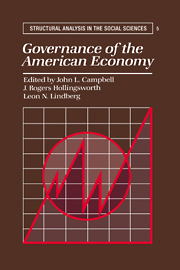Book contents
- Frontmatter
- Contents
- List of figures
- List of tables
- List of contributors
- Preface
- I Conceptual and historical foundations
- II Empirical studies of governance transformations in the United States
- 3 Transformations in the governance of the American telecommunications industry
- 4 Contradictions of governance in the nuclear energy sector
- 5 The statist evolution of rail governance in the United States, 1830–1986
- 6 Governance of the steel industry: What caused the disintegration of the oligopoly?
- 7 Governance of the automobile industry: The transformation of labor and supplier relations
- 8 The dairy industry: From yeomanry to the institutionalization of multilateral governance
- 9 Economic governance and the American meatpacking industry
- 10 The invisible hand in healthcare: the rise of financial markets in the U.S. hospital industry
- III Theoretical evaluation of the empirical cases
- References
- Index
8 - The dairy industry: From yeomanry to the institutionalization of multilateral governance
Published online by Cambridge University Press: 21 March 2010
- Frontmatter
- Contents
- List of figures
- List of tables
- List of contributors
- Preface
- I Conceptual and historical foundations
- II Empirical studies of governance transformations in the United States
- 3 Transformations in the governance of the American telecommunications industry
- 4 Contradictions of governance in the nuclear energy sector
- 5 The statist evolution of rail governance in the United States, 1830–1986
- 6 Governance of the steel industry: What caused the disintegration of the oligopoly?
- 7 Governance of the automobile industry: The transformation of labor and supplier relations
- 8 The dairy industry: From yeomanry to the institutionalization of multilateral governance
- 9 Economic governance and the American meatpacking industry
- 10 The invisible hand in healthcare: the rise of financial markets in the U.S. hospital industry
- III Theoretical evaluation of the empirical cases
- References
- Index
Summary
Dairying is one of the most regulated industries in the American economy. The main pillars of these regulations are the antitrust exemption, federal milk-marketing agreements, price supports, and import controls. Perhaps more importantly, the dairy industry is an interesting example of multilateral governance. Dairy producers organized collective-bargaining associations, such as the National Milk Producers Federation, and promotional networks in order to overcome market failures that were the result of the unequal power relationships between dairy producers and processors. In particular, the history of the National Milk Producers Federation illustrates how a trade association can acquire increased autonomy and the ability to govern an industry for over fifty years.
These multilateral forms of governance, which originated primarily in the midwest, were embedded within a specific “dairy culture,” based on solidaristic values and shared norms of existing social collectives. The promotional networks brought together diverse actors from different parts of the agricultural system, such as dairy cooperatives, agricultural scientists at the land-grant universities, members of the state extension services, and the U.S. Department of Agriculture (USDA), for the purpose of designing rules in keeping with the specific needs of the dairy producers. The common bond between the leaders and the members of cooperative associations allowed the leadership to pursue long-term strategies for the management of the industry's overproduction and pricing problems.
This particular governance regime, resting on associations and promotional networks, was sanctioned by the state, yet it avoided direct state intervention.
- Type
- Chapter
- Information
- Governance of the American Economy , pp. 236 - 258Publisher: Cambridge University PressPrint publication year: 1991
- 6
- Cited by

